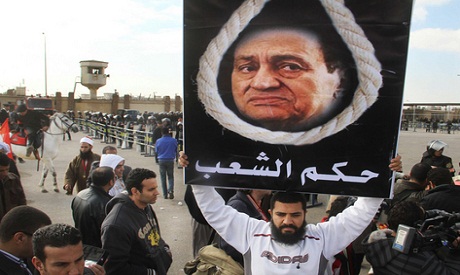
The April 6 Youth Movement is calling for large-scale demonstrations on the anniversary of the January 25 uprising. With final election results expected on January 7, the Brotherhood’s Freedom and Justice Party reiterated assurances that it will seek to build a coalition with liberal and secular forces. Meanwhile, Mubarak’s prosecutor recommended the death penalty for the former president and other officials.
PROTESTS:
The April 6 Youth Movement announced on January 4 that it will begin to hold daily marches to build unity in preparation for the first anniversary of the January 25 uprising. April 6 spokesman Mahmoud Afify said the group will begin distributing fliers urging Egyptians to take to the streets and demand an accelerated transfer of power to civilians. Dozens of leading activists and bloggers gathered on Kasr El-Nil Street on January 4, threatening, “Revolutionaries will be back on 25 January!” [al-Masry al-Youm, English, 1/5/2011] [al-Ahram, English, 1/5/2012]
2) Interior Minister Mohamed Ibrahim has formed a committee to consider the possibility of combining Police Day with a celebration of the revolution’s 1-year anniversary on January 25. The original January 25 demonstration was initially driven by calls for an end to police brutality issued by the April 6 Youth Movement and the Facebook page dedicated to the memory of Khaled Said, tortured by police in Alexandria last year. [al-Masry al-Youm, English, 1/5/2012]
NGO INVESTIGATION:
3) According to NDI’s MENA director, Les Campbell, the Egyptian government has yet to return any of the property or cash seized in raids on 17 NGO offices in Cairo. Ambassador Anne Patterson stated on December 30 that Egyptian officials had promised to return confiscated property “immediately.” [LATimes, English, 1/30/2011] [CNN, English, 1/5/2012]
4) A movement calling itself the Silent Majority has called for a protest outside of the American Embassy on January 7 to reject U.S. interference in Egyptian affairs and funding of unlicensed NGOs. The group issued a statement claiming that the government raids on NGO offices had not violated Egyptian law. [al-Shorouk, Arabic, 1/6/2012]
ISLAMISTS:
5) The Brotherhood’s Freedom and Justice Party reiterated its position against an Islamist coalition including Salafis and its preference for an alliance including liberal and secular parties. “The party’s winning of the majority in the new parliament does not mean going it alone in writing the constitution without consideration for the rights of other Egyptians, or ignoring the political forces which did not get a majority or failed in the parliamentary elections,” said FJP president Mohamed Morsy. [LA Times, English, 1/5/2012]
6) Mohamed Salah Zayed, head of the Sufi party, New Triumph, said that Sufi groups are coordinating to select a “strong candidate” for the presidential election. [al-Youm al-Saba’a, Arabic, 1/5/2012]
US-EGYPT RELATIONS:
7) Jeffrey Feltman, Assistant Secretary of State for Near Eastern Affairs, discussed the Dec. 29 raids on NGOs with top Egyptian officials during a visit to Cairo and reported that three recently raided American organizations would be allowed to reopen. Feltman identified Egypt as the most important U.S. partner in the Arab world and said, “This NGO crisis won’t affect US-Egyptian relations.” [Washington Post, English, 1/5/2012] [al-Youm al-Saba’a, Arabic, 1/5/2012]
MUBARAK TRIAL:
8) The Cairo Criminal Court adjourned the trial of ousted President Hosni Mubarak until January 9, after the prosecution recommended death sentences for the former president, former interior minister Habib al-Adly and six of al-Adly’s assistance. [al-Ahram, English, 1/5/2012] [al-Masry al-Youm, English, 1/5/2012]
ECONOMY
9) An expected visit by an IMF delegation to Cairo this month to discuss the Egypt’s economic problems has been delayed for “a few weeks,” according to Planning and International Cooperation Minister Faiza Aboul Naga. [Reuters, English, 1/3/2012]
10) Egypt’s foreign reserves fell by half over the last year, dropping to $18.12 billion in December 2011 from $36 billion in December 2010. Economic experts warn that the continued decline in foreign reserves may drive international institutions to lower Egypt’s credit rating. They also cautioned that the country may soon be unable to settle its debts or support its local currency leading to rising interest on foreign loans and a possible change in the World Bank’s lending terms. [al-Masry al-Youm, English, 1/5/2012]
Photo Credit: Reuters
Image: 2012-634613764262255234-225.jpg
